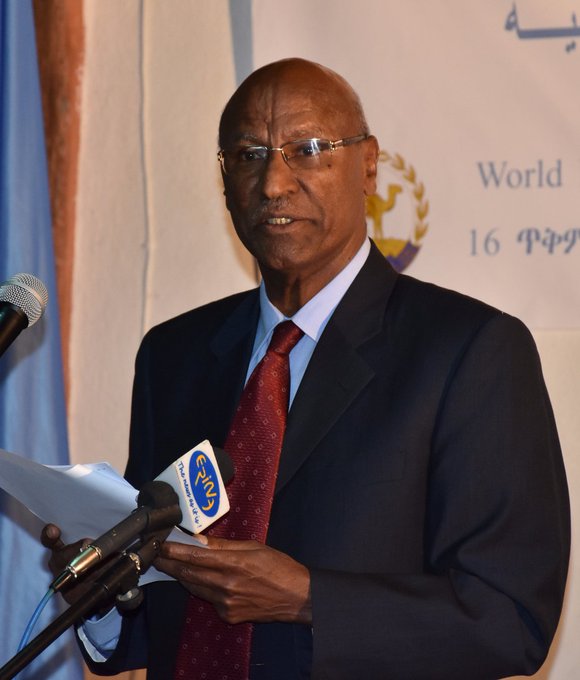Ms. Bui Thi Lan, FAO Representative in Eritrea!
Ms. Susan Namondo Ngongi, Resident/ Humanitarian Coordinator (UN) and UNDP Representative!
High Government, PFDJ and Army Officials!
Excellences Ambassadors and Members of the Diplomatic Corps.!
Religious Leaders!
Members of the Farming Community!
Invited Guests!
Ladies and Gentlemen!
At the outset, I would like to express my gratitude to all of you for accepting our invitation to participate in this very important occasion.
This year's World Food Day theme is "Change the Future of Migration - Invest in Food Security and Rural Development".
As we can all appreciate, even though migration nowadays is receiving more global coverage and attention and manipulated for different ends, it has been part of human behavior for centuries.
Migration is the movement of people within the boundaries of a country or across boarders. Usually, the in country movement is from the rural areas to the urban centers. This is particularly so because job opportunities are created in towns and cities due to industrialization and other economic factors and at the same time social services and other amenities are almost absent or inadequate in the rural areas. However, the opposite flow can take place during conflict time as people feel safer in or around their villages and especially when the urban centers become the main battle grounds.
On the other hand, International migration as we see it today, is getting extremely pronounced due to multiple factors. Generally youth from the developing countries migrate to the developed countries for what they perceive as greener pastures. Others migrate to escape war and violence. Even those with very good education and skill migrate for better paying jobs. All these and others, however, can be summarized into a "push" and "pull" factors which translates to the un encouraging situation at the point of departure and the rosy promises and attractions at the destination. Nowadays, as it is very clear to all of us, human traffickers, organized at a global level are taking migration as a very lucrative business and that is why even kids who cannot reason out are becoming victims of this organized crime.
To save humanity from this evil and crippling phenomenon, we have to change the future of migration. We have to invest in food and nutrition security and rural development.
This is a global mission with national implementation. Every country must contribute its fair share for the global objective to be met. In this regard, let me briefly outline what Eritrea is doing by way of investing in food and nutrition security and rural development. The most limiting factor for agriculture, which is the mainstay of the Eritrean economy, is water and this is precisely the reason why the Government is spending a significant portion of its resources in water harvesting in the form of big, medium and small dams, ponds in particular and soil and water conservation in general. The rural road infrastructure has also taken a good share of the government resources and attention. As a result almost every village is connected to the network. Health and Education services are very wide spread within a diameter of five kilometers. Transportation and communication, energy and the provision of potable water has improved significantly over the years. Agricultural extension services and the availability of improved crops and livestock and rural credit systems are increasing in scope and depth thereby impacting the livelihood of the rural community positively.
Beyond this, because of the Government's policy of even development throughout the country many villages and semi-urban centers have developed into towns and urban centers with satisfactory social services and this naturally minimizes the flow of people from the rural areas to the relatively larger towns.
Apart from the above mentioned foundation, the Government is shifting from the back-breaking traditional agriculture to technology-driven modern agriculture in order to make it youth friendly. Irrigated agriculture, with special emphasis to pressurized agriculture with alternative energy, mainly solar, is being introduced. Protected agriculture in the form of green houses and poly-tunnels are being promoted. High-value crops like vegetables, fruits and flowers mainly for export, are getting more emphasis. The outcomes of dairy, poultry, piggery apiary etc. are increasing in amount and quality. The farms around the big dams are fine-tuning their irrigation infrastructures to demonstrate modern commercial agriculture that will eventually benefit the youth and attract more into farming businesses and career in the agriculture value chain. "The Minimum Integrated Household Package" which is small intensive and integrated, is already providing food and nutrition at household level and is spreading at a commendable speed. Finally, all these undertakings and, more to come, will hopefully change the future of migration in Eritrea.
In conclusion, I would like to express my profound gratitude to the organizers of this event for a job well done.
I thank you for your attention !
Arefaine Berhe
WFD, 16 October, 2017
